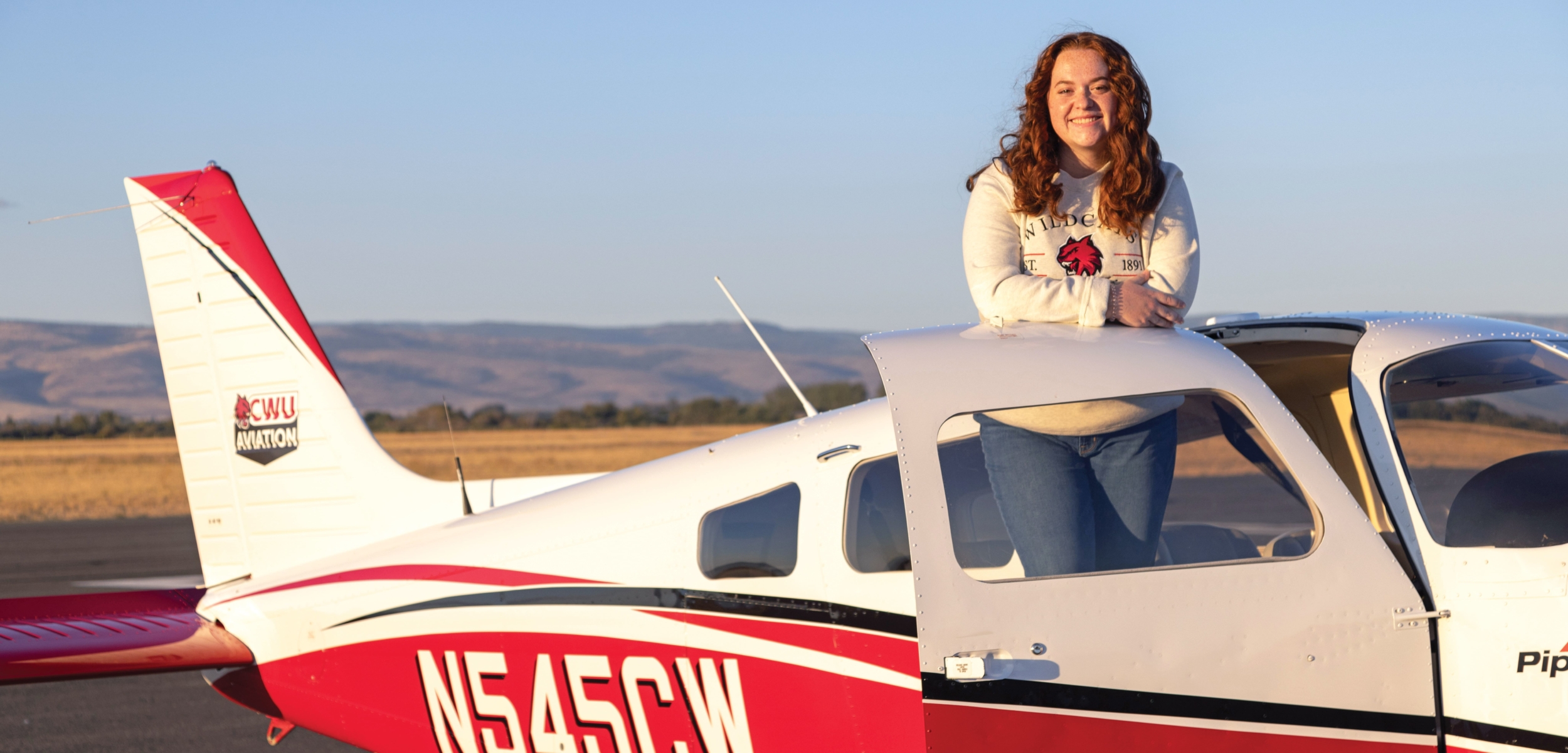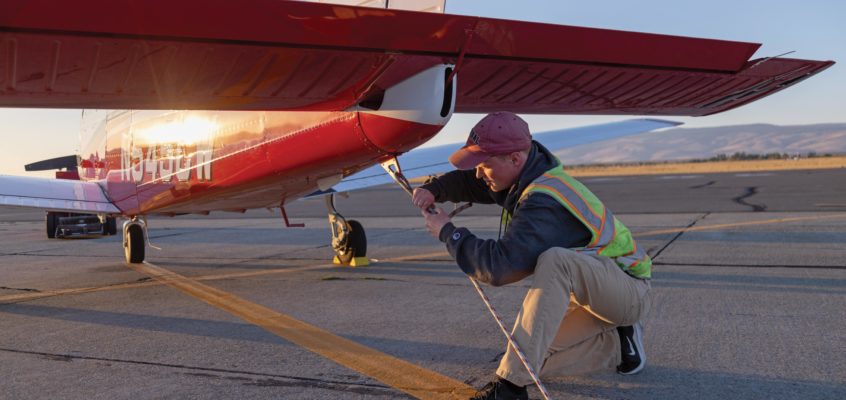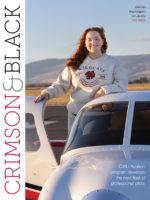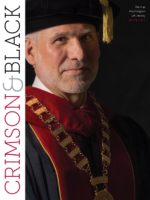
The U.S. commercial aviation industry could soon be facing a pilot shortage that is increasingly dire, with some sources reporting a projected shortage of 18,000 pilots in the coming years.
Even the U.S. Congress got involved last summer, hearing testimony from the airline industry and advancing controversial legislation calling for the Federal Aviation Administration (FAA) to improve recruitment and retention and raise the mandatory retirement age for commercial pilots as a way to cope with the pilot shortfall.
But at Bowers Field—the small, single-runway regional airport in Ellensburg—faculty and flight instructors from CWU are working to address this shortage in their own way: by training their top students to become the next generation of commercial airline pilots.
Central’s aviation program has been around since the 1970s, and officially became a standalone department in 2006. The college boasts a 100% job placement rate for graduates and offers one of the only public four-year aviation degrees on the West Coast.
Those statistics, paired with a nationally renowned faculty, create a competitive program with more applicants than it has seats.
For the 2023-24 academic year, the four-year professional pilot degree program has 200 students sharing 19 aircraft and one runway. The program saw 185 first-year applicants last spring, according to department chair Dr. Sam Pavel (’85). Of those applicants, 67 were admitted and accepted to begin their training in Ellensburg this fall.
The remaining 123 students were placed on a waiting list.
“It’s unprecedented the way the need for pilots has exploded over the last several years,” Pavel said. “The baby boomers are at that mandatory retirement age, and they can’t fly with a commercial airline anymore. And so many people are wanting to travel. It’s a great time to get into the industry.”
••••••••
Facing the Challenges
Despite the demand, aviation isn’t a field people can jump into if they’re looking for a big paycheck. The training is demanding, with mandatory flight-hours and physical requirements, and the costs can often be prohibitive. Even after earning their license and pilot’s degree, students must clock 1,000 hours of flight time before they are eligible for a job with a major commercial airline.
Among the students who are eager and willing to face these challenges is Emma McLaughlin, who is in her final year of commercial flight studies in the Department of Aviation. Growing up in Federal Way, McLaughlin thought she’d be a teacher or an athletic coach since those were the jobs she saw the women around her doing.

CWU senior Emma McLaughlin.
But in middle school, she joined Amelia’s Aero Club at the Seattle Museum of Flight, and her passion took flight.
“I joined the club, and I got to go up in the air, and I loved it,” she said. “I thought, ‘I didn’t know I could do this!’ Once I got up in the sky, I felt like there was no way I could do anything else; I have to do this.”
McLaughlin went on to earn her private pilot’s license as a senior in high school. She chose Central because of its stellar reputation in the industry and its proximity to home. She looks at the airline industry with hope for the future, for her own career, and for people around the world.
“I want everyone in the world to be able to go places and travel,” she said. “That’s my goal in life—I want to see the world. I want my kids someday to be able to hop on a flight and go. It’s amazing what aviation is able to do.”
••••••••
Focus on Student Success
One of the main reasons McLaughlin was drawn to Central was the quality of the instructors. Among them is Dr. Amy Hoover, who was named the National Certified Flight Instructor of the Year in 2022 through the General Aviation Awards program. Other CWU instructors have had long careers in the industry and with the FAA, bringing real-world experience to the tarmac and the classroom.
Hoover and Pavel both attribute the success of the CWU aviation program to not only the faculty, but also to the high-quality students who choose to come to Ellensburg.
“Student success has always been a top priority,” Hoover said. “The industry needs smart, committed and capable professionals. Learning to fly or be an aviation mechanic or other professional is not particularly difficult, but it does take commitment.”
Those who remain committed go far, Pavel said, with Wildcats flying for nearly every domestic airline and holding lead roles across the industry.
Alumnus Wes Clapper (’04) is a captain with JetBlue Airways, flying out of Los Angeles. He also serves as vice president of finance/treasurer for the Air Line Pilots Association, International (ALPA), the world’s largest airline pilots union.
“It’s an exciting time to be an airline pilot,” said Clapper, a Spokane resident. “Pilots today have more opportunities and a brighter future than any generation before them. They can choose where they want to start their career, and most will have their choice of which major airline to fly for.”
Clapper stays involved with Central as a mentor and helped form the university’s Aviation Collegiate Education (ACE) Club through ALPA. He credits his success to the challenges of learning to fly in the Kittitas Valley skies. He also encourages students to pursue a minor in aviation management.
“Aviation is a cyclical industry, and I know many other classmates who have relied on that minor degree,” he said.
Pavel noted that the bachelor’s degree track makes Central students more competitive in the industry, while also giving them alternative career paths to protect them from the, at times, boom-or-bust nature of the commercial airline industry.

CWU Aviation student Trace Erwin works on the ground crew at Bowers Field in Ellensburg.
Pilots also are subject to rigorous medical exams at least once a year. Pavel cautioned that a personal health issue can end your time in the cockpit, so it never hurts to have a backup plan.
“You need to have that degree to fall back on,” he said. “It gives you options. You can go on and get a master’s if you have a four-year degree. Or, say you want to move up into management. You’ve got to have that bachelor’s.”
••••••••
Increasing Diversity in the Skies
Along with meeting the industry’s growing need for pilots, the Department of Aviation is also proud of its efforts to increase diversity and representation in the cockpit. Globally, only about 3% of airline pilots are women. By contrast, Central’s incoming class for the current academic year is 30% women, Pavel said.
“The industry is changing; it’s less of a good ol’ boy system,” Pavel said. “Our program is this blending pot of people from a lot of different backgrounds who are going to be pilots. That’s amazing.”
In addition to being a flight instructor, Hoover serves as the advisor for the Women in Aviation club, which promotes diversity and outreach. She believes working with aspiring female pilots from all different backgrounds is making a tangible difference, both at CWU and in the industry.
“It is important to increase the number of women professionals in aviation to demonstrate to young girls that they can follow their dreams and are capable of doing whatever they want to apply themselves to,” she said.
McLaughlin is now president of CWU’s International Women in Aviation chapter, and also serves as secretary of the ALPA ACE club. One of her goals is to promote the career option to underrepresented groups. This year, she and her peers are hoping to start a chapter of the National Gay Pilots Association (NGPA) to support the LGBTQIA+ community.
“We want to be as diverse and inclusive as possible, and get more people interested and involved in the field,” McLaughlin said.
After spending the past four years at Central, McLaughlin is looking forward to her future as a pilot. The program maintains strong alumni connections, and many of the flight instructors are recent graduates who are earning their hours on their way to something bigger.
“At least once a quarter, airline pilots come in and talk about how they got to where they are, and we can ask them any questions we want,” she said. “It’s really cool to have that connection. We get to watch our certified flight instructors go to the airlines, and see them go achieve their dreams, and think, ‘I can follow them right in their footsteps.’"






comments powered by Disqus